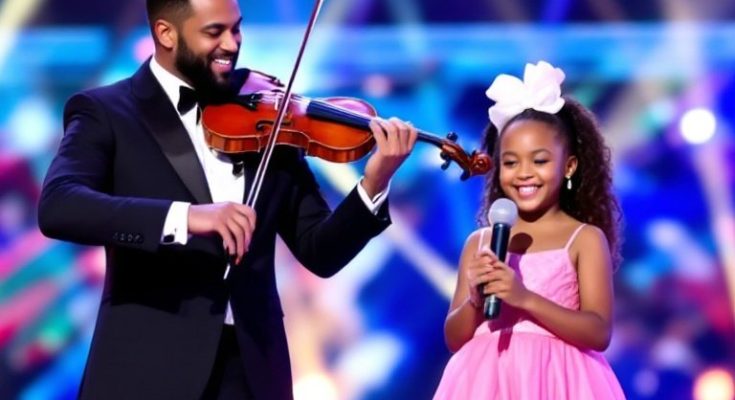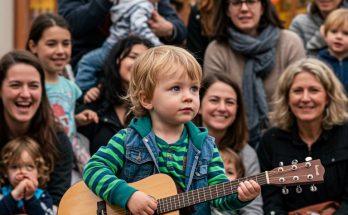It started like any other talent show segment—crowds buzzing, stagehands rushing, and judges sipping their drinks, preparing for another round of hopeful performers. The announcer called the next act, and a collective “Aww” swept through the auditorium as a tiny girl, barely three feet tall, waddled onto the stage holding a stuffed bunny in one hand and a glittery mic in the other.
Her name? Lily Monroe. Age? Just three.
Wearing a yellow sundress with pigtails bouncing behind her, she approached the mic stand, which was far too tall for her. One of the stagehands adjusted it while the audience chuckled. Even the judges smiled, their pens already poised to write words like “cute,” “adorable,” or “too early for TV.”
“Hi Lily,” said the host, kneeling beside her. “What will you be singing for us today?”
Without missing a beat, Lily answered, “Twinkle, Twinkle… but the fancy way.”
The judges exchanged amused glances. The audience laughed again. Everyone expected a sweet little moment, the kind parents record and treasure for years, maybe even one to go viral for being “so precious.” No one expected what came next.
The piano played the opening notes, but it wasn’t the simple lullaby everyone knew. The arrangement was slower, deeper—almost cinematic. Then Lily opened her mouth.
The first note hung in the air like magic. Her pitch? Perfect. Her tone? Clear and haunting. It wasn’t just that she could sing—it was how she sang. She held the mic like she’d done it a hundred times. She carried each line with an emotional depth that shouldn’t have been possible at her age.
Gasps rippled through the audience. Phones flew into the air, recording every second. A few jaws visibly dropped. One judge leaned in, blinking in disbelief. The producer backstage froze, staring at the monitor.
By the second verse, some people were crying.
She ended the song with a soft, perfect vibrato, eyes closed as if she truly understood every word. Then, just like that, she grinned, gave a little wave, and said into the mic, “Thank you very much!” before skipping offstage with her bunny in tow.
Silence.
Then, thunderous applause.
The host returned to the stage, clearly shaken. “I… I have no words,” he admitted. “Ladies and gentlemen, we’ve just witnessed something extraordinary.”
By the time the clip hit the internet, Lily had already stolen the hearts of millions. Her performance racked up views at lightning speed, with captions like “You won’t believe this voice!” and “A 3-year-old just gave the performance of a lifetime.”
TV stations called. Radio interviews followed. Vocal coaches and musicians praised her pitch, her control, and most of all, her soul. Parents everywhere watched in awe, many wondering how a toddler could tap into something so emotionally powerful.
But for Lily? She was just happy to have gotten a sticker and a cookie after the show.
In interviews later, her mom revealed that Lily had been humming melodies before she could even speak properly, often singing to her stuffed animals for hours. She never had formal training. She just… loved to sing.
And while no one knows where Lily’s voice will take her next, one thing’s for sure: that tiny girl in the yellow dress reminded everyone that age doesn’t define talent—and sometimes, the smallest voices make the biggest impact.




